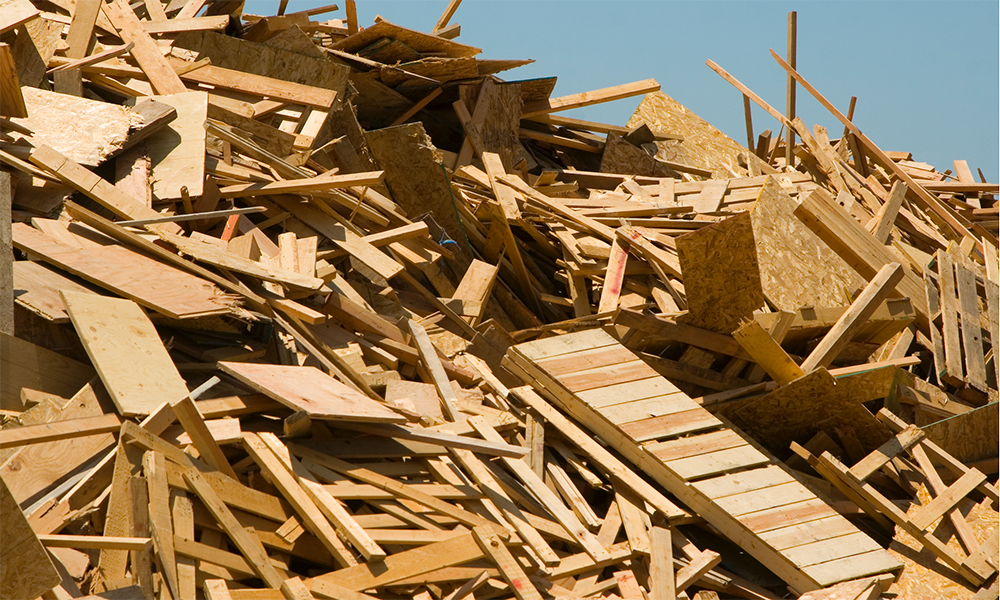Kingston University’s3D materials workshop at Kingston School of Art gives students significant freedom to develop their work. Students are supported by highly‐engaged and skilled technicians to work with materials such as wood, metal, stone, plastic, plaster, bio‐resins, wax, and ceramics.
Alongside this, students are also supplied with ‘free’ recycled materials, whereby, the ethos of ‘Thinking through making’ is facilitated by maintaining a parity of fairness of material use to all students.
As part of this initiative, the 3D workshop technical team collaborated with a local bespoke panel cutting service provider, Cutwrights Limited. Cutwrights strive to minimise their overall environmental footprint by offering local schools, universities, and charities unwanted wooden sheets that would normally be rejected as waste.
Kingston School of Art take these unwanted wooden sheets – comprising of MDF, chipboards, and some plywood – with 95% reused by the students for anything from making work to prototyping.
Contributing towards one of the University’s sustainability commitments of optimum utilisation of resources through fixing and reusing materials, the School decided to evaluate the carbon benefits from this particular collaboration. The results were very encouraging from environmental, social, and business point of view. This adds to the argument demonstrating that collaborative measures enable the overall benefits of reuse (Tavriet al., 2015).
“As educators we want to encourage our students to gain knowledge of different materials, and the consideration of their sustainability. We have a responsibility to reduce waste at Kingston School of Art and recycle as much material as possible.”
 The results show that in 30 months period of time, from June 2016 to November 2018, the estimated carbon savings were approaching 27 tonnes. Furthermore, collaboration with a local supplier enabled control of the logistics emissions and cost, which in the same period of time only came up to 0.14 tonnes CO2e.
The results show that in 30 months period of time, from June 2016 to November 2018, the estimated carbon savings were approaching 27 tonnes. Furthermore, collaboration with a local supplier enabled control of the logistics emissions and cost, which in the same period of time only came up to 0.14 tonnes CO2e.
The model presents a win-win scenario, as the initiative also enabled Cutwrights Limited to divert Grade C wood (mostly get incinerated) from the landfill to reuse and saved them the disposal cost of almost £2,400 in addition to the logistics cost.
Cutwrights Limited Project Manager Chloe Seddon said the ongoing relationship with Kingston University had proven highly beneficial to both parties. “The collection and recycling of these waste panels has greatly improved the efficacy of our internal waste management system. We are able to easily separate the potentially useable materials that may otherwise have been disposed of via our biomass system, saving both time and money in regards to machine usage and labour.”
 “During our increasingly frequent busy periods this arrangement has proven even more invaluable. As higher volumes of materials pass through our workshop and the waste management system nears capacity, previously there would have been a risk that waste panels may have been collected at cost for recycling or landfill, the risk is now decreased exponentially. As we expand we hope to further cultivate this rather symbiotic agreement with Kingston University and other similar institutions.”
“During our increasingly frequent busy periods this arrangement has proven even more invaluable. As higher volumes of materials pass through our workshop and the waste management system nears capacity, previously there would have been a risk that waste panels may have been collected at cost for recycling or landfill, the risk is now decreased exponentially. As we expand we hope to further cultivate this rather symbiotic agreement with Kingston University and other similar institutions.”
Richard Trupp, Head of Workshops at Kingston School of Art, said the project was motivated by the University’s sustainability drive. “As educators we want to encourage our students to gain knowledge of different materials, and the consideration of their sustainability. We have a responsibility to reduce waste at Kingston School of Art and recycle as much material as possible.”
Alongside the aforementioned direct encouraging impact, the workshops help to educate students in their thinking about sustainability and environmental concerns within their working practice. This has led to much more far-reaching implications, such as facilitating pro-environmental behaviour (Tavri, 2019).
One such example is demonstrated by two Kingston School of Art graduates. In 2018, Rob Nicol and Rowan Minkley created ‘Chip[s] Board‘ – an eco- friendly alternative to MDF made from potato peelings. Rowan Minkley says that using Chip[s] Board could enable structures to be constructed quickly and cheaply while drastically cutting down on the waste materials normally left behind.“We want this product to make a positive impact on the world and inspire more young people to find creative solutions to world issues”, he said.
The 3D materials workshop and the resourceful initiatives at the Kingston School of Arts present reuse and up-cycling as a win-win realistic practice instead of simply an idealistic opportunity. The workshop demonstrates that nudging individuals and supply chain towards pro-environmental behaviour require unleashing the ideas from within. This can be achieved by providing appropriate tools, education, awareness, and collaboration.
Author
Purva Tavri
Purva is a Chartered Waste Manager and an Associate Fellow of Higher Education Academy. Alongside her doctoral research, she is working in partnership with charities and social enterprises in London to procure funding for community-led projects to improve local environmental quality and recycling/reuse performance.

